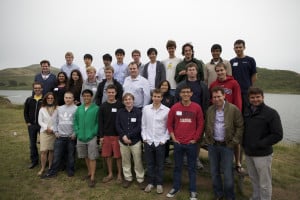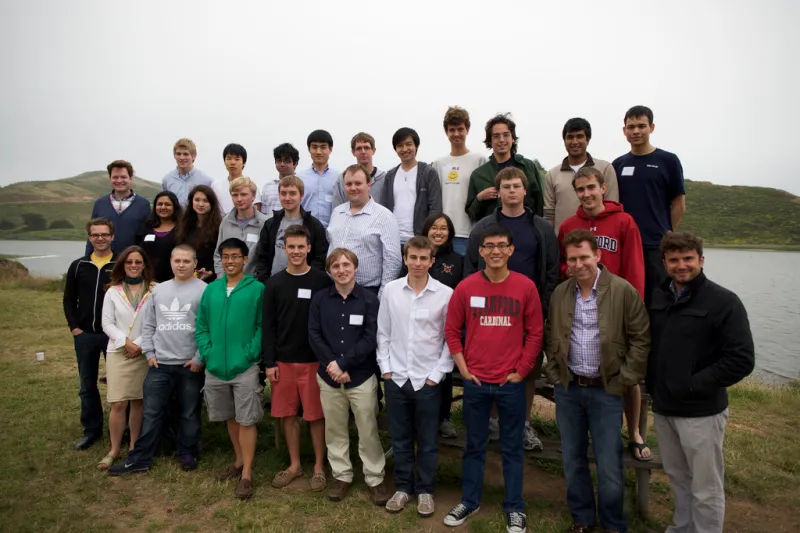
More than 100 Stanford students have applied for the Thiel Fellowship, a program founded in 2010 by entrepreneur Peter Thiel ’89 J.D. ’92 that offers students $100,000 to drop out of college for two years and pursue a project of interest. Three Stanford students have been accepted to the Fellowship in its two classes thus far.
According to Thiel Fellowship Program Director Danielle Strachman, Thiel created the program to encourage young entrepreneurs and researchers to take a chance on their ideas instead of following a traditional career path.
“It is safer to go out and get an investment banking job,” Strachman noted. “Most people aren’t going out and doing something risky and innovative because they no longer really have the time or the capital to spend on those things. For some fellows, it was really just a godsend to be able to have this time.”
Among the Fellowship’s Stanford contingent, Tom Currier ’13 and Ph.D. candidate Andrew Hsu joined the first class of 21 fellows in 2011, and Omar Rizwan ’16 was accepted to the second class of 20 fellows in 2012.
Hsu, who founded an educational gaming startup called Airy Labs, graduated with three degrees from the University of Washington at age 16. In 2007, he enrolled as a Ph.D. candidate in Stanford’s neuroscience program and was in the fourth year of the program when he left to accept the fellowship.
While Hsu was the first Thiel Fellow to raise venture funding, Airy Labs has since been the subject of controversy. Large cuts were made to the company’s workforce last year, and a number of ex-employees have complained that Hsu was an inexperienced and unreasonable manager.
Currier, who left Stanford after his sophomore year to become a Thiel Fellow, has avoided such scrutiny to date. The alternative energy company that he launched in 2010, Black Swan Solar, was in the first class of StartX, a Stanford-exclusive startup accelerator. Currier cofounded a new company, Campus, in December of 2012.
Rizwan, Stanford’s most recent Thiel Fellow, was accepted into the program while still in high school. He delayed his participation to enroll in Stanford in 2012, but left at the end of fall quarter after realizing what he wanted to do with his fellowship.
“I really liked my time at school and made a lot of good friends there, but I was excited to use what I learned there to build some stuff on my own that people could actually use,” Rizwan said.
Rizwan said that his interest in different models of education led him to apply for the fellowship and that he hopes to explore his ideas in a “free-form way” during his two years as a fellow.
“I think there is a lot of value to the college experience socially and academically, but I also think the format of classes can be kind of constraining,” he said. “It will be good to build some tangible projects and products that can actually go out and affect the real world, which is sort of difficult to get if you are just sitting down and doing homework and taking exams.”
Rizwan has traveled extensively around the country to develop his project. He applauded the program’s flexibility in allowing fellows to pursue their interests. According to Strachman, fellows are not required to stay in the Bay Area, though they do meet monthly with a personal advisory board and have a formal review with the Thiel Foundation every three to four months.
“It’s been really great. The Foundation is very supportive,” Rizwan said. “As long as you’re confident in your project and you feel like you are learning things and you’re driven, it’s a great experience.”
Alice Fang ’15, vice president of the Business Association of Stanford Entrepreneurial Students (BASES) Freshman Battalion, expressed her desire to follow in Rizwan’s footsteps.
Fang is currently in the second round of the fellowship’s application process. She applied with the intention of developing a science journal she founded while in high school. She first heard of the fellowship in the fall of 2011 when Thiel spoke at an event hosted by BASES. Fang said that she was attracted to the program for many of the same reasons she chose to enroll in Stanford.
“It has that spirit of what education today can be like, and it’s not like a format that everyone follows, it’s sort of going out there and being entrepreneurial,” she said.
Although Fang downplayed her chances of being selected as a fellow, she said she would accept the fellowship without hesitation.
However, some students questioned whether or not the program provides a more valuable experience than a Stanford education.
Andrew Han ’16 said that he first heard of the Thiel Fellowship in high school but noted that he likely wouldn’t apply to the program even if he was qualified.
“The idea is that they are paying you to drop out of college, and $100,000 isn’t that much money to start up a business,” Han said. “As smart as you are, I feel like college is a time of personal development and personal growth, and I think foregoing it is very proud, almost to the point of arrogance.”
Han said that he views the Thiel Fellowship as a “two-year paid vacation” and believes that the Silicon Valley legend of dropping out of college to start a business can be dangerous if over-reliant on a few prominent examples such as Mark Zuckerberg and Bill Gates.
“Timing isn’t everything, as some startup people would like to believe,” he said. “With that said, if you truly believe that you have a good idea, by all means you should take risks.”
